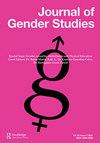The techno-beauty myth: the self-representations of young Chinese women on social media
IF 1.5
3区 社会学
Q2 SOCIAL ISSUES
引用次数: 1
Abstract
ABSTRACT This study aims to investigate how young Chinese women use selfie-editing apps to create idealized versions of themselves and how these practices help them construct their identities. By conducting 30 interviews with highly educated Chinese women between the ages of 18 and 30 living in urban cities, the results of this study indicate that taking, editing, and sharing selfies have become increasingly embedded in their everyday lives. The female interviewees use the apps to narrow their jawline, change the size of their eyes and nose, remove acne, and smooth their skin, revealing that young women in China are not completely free of patriarchal beauty standards. However, the interviewees acknowledge that the selfies have captured their real lives and conveyed their personalities. They have been able to express their true selves and have gained self-pleasure from this process. In this way, the interviewees’ online self-representation is deeply linked to their offline lives. This study enriches current debates on women’s empowerment in contemporary China. The practice of online self-representation can be viewed as a process of self-actualization because it empowers women by solidifying their agency and further contributes to the formation of a reflexive identity.科技美女神话:中国年轻女性在社交媒体上的自我表征
本文章由计算机程序翻译,如有差异,请以英文原文为准。
求助全文
约1分钟内获得全文
求助全文
来源期刊

Journal of Gender Studies
Multiple-
CiteScore
4.40
自引率
0.00%
发文量
52
期刊介绍:
The Journal of Gender Studies is an interdisciplinary journal which publishes articles relating to gender from a feminist perspective covering a wide range of subject areas including the Social and Natural Sciences, Arts and Popular Culture. Reviews of books and details of forthcoming conferences are also included. The Journal of Gender Studies seeks articles from international sources and aims to take account of a diversity of cultural backgrounds and differences in sexual orientation. It encourages contributions which focus on the experiences of both women and men and welcomes articles, written from a feminist perspective, relating to femininity and masculinity and to the social constructions of relationships between men and women.
 求助内容:
求助内容: 应助结果提醒方式:
应助结果提醒方式:


